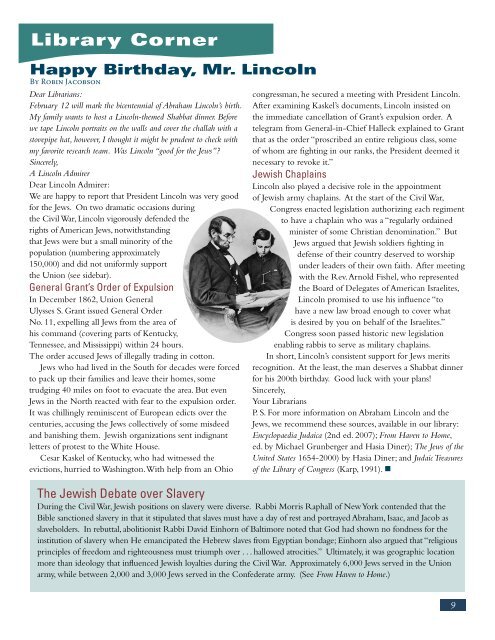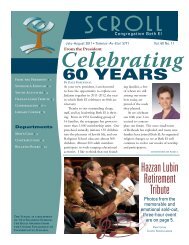widening the circlecontinued from page 6viduals in 2002; in 2007, it servedmore than 7,225. “It’s a reallyspecial organization,” said Ruth.“I feel good about the small partthat I play.” To volunteer, contactA Wider Circle at 301-608-3504,or visit www.awidercircle.org formore information. •In Case of Inclement Weather- If Montgomery County Public Schoolsare closed, <strong>Beth</strong> <strong>El</strong> Preschool and ReligiousSchool are closed, and Vatikkim is cancelled.- If Montgomery County schools have adelayed opening, BEPS will start at 10:15am and end at 12:15 pm. Religious Schoolclasses will take place as usual. Call the officeregarding Vatikkim.- All religious services will take place asscheduled.- A message is placed on the synagogue’s CurrentInformation Line (301-652-8569, ext. 2)by 7:00 am on days when any class or programis cancelled or delayed. Should inclementweather begin after 7:00 am, the message willbe updated during the day as needed. Thesame information will be sent to the listserv.- Religious School information will alsobe included on a message on the SchoolInformation Line: 301-652-8569, ext. 346.Preschool information will be included in amessage on the BEPS information line: 301-652-8569, ext. 311.Scholar-in-Residence WeekendRabbi Nina <strong>Beth</strong> CardinFriday, February 6 – Sunday, February 8To Till and to Tend: Tikkun Olam and TevaFriday evening congregational dinner and lectureShabbat morning d’var Torah, Shabbat afternoon textstudy, Sunday morning discussionRabbi Nina <strong>Beth</strong> Cardin is the general consultant for theCoalition on the Environment and Jewish Life (COEJL) anddirector of the Baltimore Jewish Environmental Network(BJEN) She is the author of several books, including A Tapestryof Jewish Time and Tears of Sorrow, Seeds of Hope.A Shabbat dinner will follow the 6:30 pm Fridayservice. Advance reservations are required.Please return this completed dinner reservation formby Tuesday, February 3, with your check made payableto <strong>Beth</strong> <strong>El</strong>.Name _______________________________________Daytime phone________________________________E-mail address ________________________________# Member adults/teens @$22___ Total $_________# Nonmember adults/teens @ $25____ Total $______# Children 6 – 12 years @$10______Total $________# Children 2 – 5 years @$6_______Total $_________Children under 2 are free.Total due: $________Please provide _____________ vegetarian meals.I/We would like to sit with____________________________________________________________________Mail to or drop off at <strong>Congregation</strong> <strong>Beth</strong> <strong>El</strong>, 8215 OldGeorgetown Road, <strong>Beth</strong>esda, MD 20814Questions? Contact <strong>El</strong>isha Frumkin,301-652-8569 x 319 or efrumkin@bethelmc.orgUnited Synagogue of Conservative JudaismAzor Hof HaYam/Seaboard Regioncordially invites you to theSECOND ANNUALYOUNG LEADERSHIPRECOGNITION RECEPTIONPlease join us as we honor this year’s young leaders fromacross the Seaboard Region who have exhibited outstandingcommitment to their congregation, their region, andthe Conservative movement.Sunday, March 15, 200919 Adar 5769, 5:00 pm<strong>Congregation</strong> B’nai Tzedek10621 South Glen RoadPotomac, MD 20854Cost: $54.00 per personFor further information: 301- 230-0801, ext. 2BETH EL HONOREES: MINDI AND BUCKY JACOBSON___ I/We look forward to attending the United Synagogue ofConservative Judaism Annual Azor Hof HaYam/SeaboardRegion Awards on March 15.q Enclosed is my check for $_______($54/person).q In addition, I want to help support future Seaboard youth andadult leadership programming and honor our congregation’snominee(s). Sponsors will be listed in the Program Journal.q $36 Friend - Chaver q $154 Sponsor - Tomekhq $72 Donor - Nadiv q $318 Pillar - AmudTotal enclosed: $________ RSVP by March 1Name______________________________________________________Address________________________________________________________________________________________________________________City_________________________________St_______Zip___________Telephone__________________________________________________Email Address ______________________________________________Synagogue Affiliation_______________________________________q I have included payment as a sponsor and want to belisted in the program journal as:________________________________________________United Synagogue of Conservative Judaism Seaboard Region121 Congressional Lane, Suite 210, Rockville, MD 2085212 8
Library CornerHappy Birthday, Mr. LincolnBy Robin JacobsonDear Librarians:February 12 will mark the bicentennial of Abraham Lincoln’s birth.My family wants to host a Lincoln-themed Shabbat dinner. Beforewe tape Lincoln portraits on the walls and cover the challah with astovepipe hat, however, I thought it might be prudent to check withmy favorite research team. Was Lincoln “good for the Jews”?Sincerely,A Lincoln AdmirerDear Lincoln Admirer:We are happy to report that President Lincoln was very goodfor the Jews. On two dramatic occasions duringthe Civil War, Lincoln vigorously defended therights of American Jews, notwithstandingthat Jews were but a small minority of thepopulation (numbering approximately150,000) and did not uniformly supportthe Union (see sidebar).General Grant’s Order of ExpulsionIn December 1862, Union GeneralUlysses S. Grant issued General OrderNo. 11, expelling all Jews from the area ofhis command (covering parts of Kentucky,Tennessee, and Mississippi) within 24 hours.The order accused Jews of illegally trading in cotton.Jews who had lived in the South for decades were forcedto pack up their families and leave their homes, sometrudging 40 miles on foot to evacuate the area. But evenJews in the North reacted with fear to the expulsion order.It was chillingly reminiscent of European edicts over thecenturies, accusing the Jews collectively of some misdeedand banishing them. Jewish organizations sent indignantletters of protest to the White House.Cesar Kaskel of Kentucky, who had witnessed theevictions, hurried to Washington. With help from an Ohiocongressman, he secured a meeting with President Lincoln.After examining Kaskel’s documents, Lincoln insisted onthe immediate cancellation of Grant’s expulsion order. Atelegram from General-in-Chief Halleck explained to Grantthat as the order “proscribed an entire religious class, someof whom are fighting in our ranks, the President deemed itnecessary to revoke it.”Jewish ChaplainsLincoln also played a decisive role in the appointmentof Jewish army chaplains. At the start of the Civil War,Congress enacted legislation authorizing each regimentto have a chaplain who was a “regularly ordainedminister of some Christian denomination.” ButJews argued that Jewish soldiers fighting indefense of their country deserved to worshipunder leaders of their own faith. After meetingwith the Rev. Arnold Fishel, who representedthe Board of Delegates of American Israelites,Lincoln promised to use his influence “tohave a new law broad enough to cover whatis desired by you on behalf of the Israelites.”Congress soon passed historic new legislationenabling rabbis to serve as military chaplains.In short, Lincoln’s consistent support for Jews meritsrecognition. At the least, the man deserves a Shabbat dinnerfor his 200th birthday. Good luck with your plans!Sincerely,Your LibrariansP. S. For more information on Abraham Lincoln and theJews, we recommend these sources, available in our library:Encyclopaedia Judaica (2nd ed. 2007); From Haven to Home,ed. by Michael Grunberger and Hasia Diner); The Jews of theUnited States 1654-2000) by Hasia Diner; and Judaic Treasuresof the Library of Congress (Karp, 1991). •The Jewish Debate over SlaveryDuring the Civil War, Jewish positions on slavery were diverse. Rabbi Morris Raphall of New York contended that theBible sanctioned slavery in that it stipulated that slaves must have a day of rest and portrayed Abraham, Isaac, and Jacob asslaveholders. In rebuttal, abolitionist Rabbi David Einhorn of Baltimore noted that God had shown no fondness for theinstitution of slavery when He emancipated the Hebrew slaves from Egyptian bondage; Einhorn also argued that “religiousprinciples of freedom and righteousness must triumph over . . . hallowed atrocities.” Ultimately, it was geographic locationmore than ideology that influenced Jewish loyalties during the Civil War. Approximately 6,000 Jews served in the Unionarmy, while between 2,000 and 3,000 Jews served in the Confederate army. (See From Haven to Home.)9



